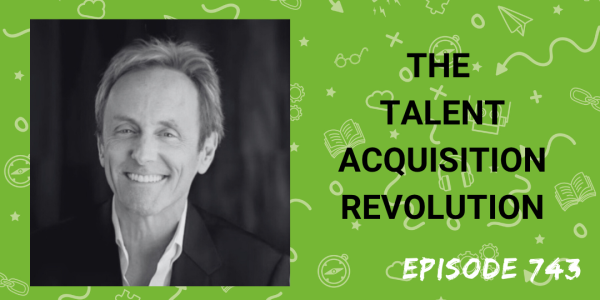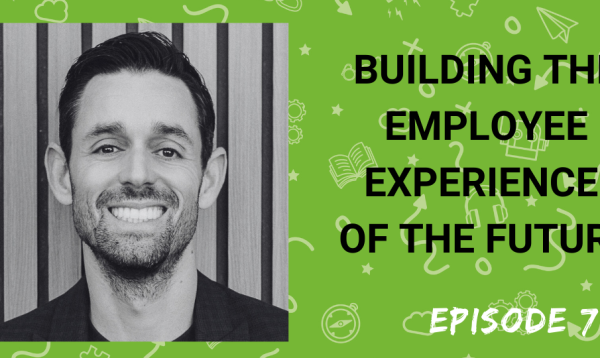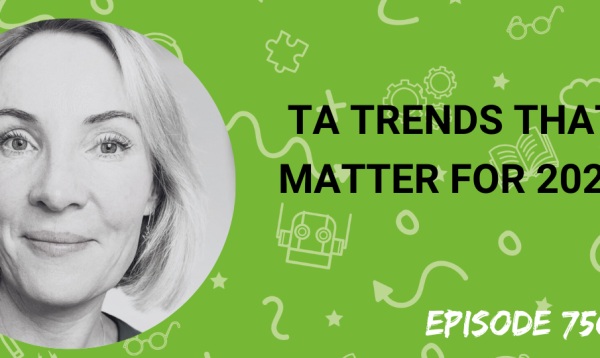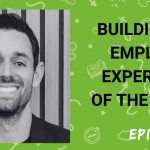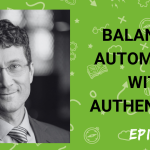The recruiting technology landscape is transforming at an unprecedented speed. AI Tools that seemed like far-fetched concepts just a few years ago are hitting the market and delivering results.
But adoption is messy and uneven. Some employers are experimenting with AI-driven interviews, while others worry about bias and legal risks. High-volume recruiters are automating entire processes while executive search remains deeply human. Everyone’s trying to figure out which tools actually work and how to integrate them without breaking what already exists.
So how should talent acquisition leaders navigate this revolution?
My guest this week is Josh Bersin, one of the world’s leading HR technology analysts. In our conversation, he reveals why this transformation is inevitable and what smart TA leaders should be doing today.
In the interview, we discuss:
• Why TA is facing a reckoning
• Time, resources, and human error
• Where AI currently has the most impact
• Mass personalization
• Regulatory risks
• What role should human recruiters be playing?
• Superworkers
• AI Fluency versus amount of work experience
• The impact on an already bloated TA Tech Stack
• Technology mergers and acquisitions
• What does the future look like?
Follow this podcast on Apple Podcasts.
Follow this podcast on Spotify.
00:00
Matt Alder
Talent acquisition isn’t just changing, it’s being completely rebuilt. AI tools that seemed impossible just two years ago are now delivering results and technology is moving ever faster. So what does this revolution actually mean for recruiting’s future? Keep listening to find out. Support for this podcast comes from Talogy, a company that’s been helping organizations around the world find, build and grow talent for more than 75 years. Talogy combines psychology and technology to help leaders make better data driven decisions about their people. The result? Stronger teams, better performance, and organizations ready for the talent challenges of tomorrow. To learn more, visit talogy.com that’s talogy.com. Hi there. Welcome to episode 743 of Recruiting Future with me, Matt Alder. Recruiting Future helps talent acquisition teams drive measurable impact by developing strategic capability in foresight. Influence, talent and technology. This episode is about technology and foresight.
01:45
Matt Alder
The recruiting technology landscape is transforming at unprecedented speed. AI tools that seemed like far fetched concepts just a few years ago are hitting the market and delivering results. But adoption is messy and uneven. Some employers are experimenting with AI driven interviews, while others worry about bias and legal risks. High volume recruiters are automating entire processes, while executive search remains deeply human. Everyone’s trying to figure out which tools actually work and how to integrate them without breaking what already exists. So how should talent acquisition leaders navigate this revolution? My guest this week is Josh Bersin, one of the world’s leading HR technology analysts. In our conversation he reveals why this transformation is inevitable and what smart TA leaders should be doing today.
02:44
Matt Alder
Hi Josh and welcome back to the podcast.
02:46
Josh Bersin
Thank you Matt. It’s great to be here.
02:48
Matt Alder
Always a pleasure to have you on the show. There are very few people who might be listening who have not come across you and your. Just give us a quick intro to.
02:57
Matt Alder
You and what you do.
02:58
Josh Bersin
Sure. I’ve been doing research on Human Capital HR Technology recruiting for almost 30 years and we are very global and we look at all the trends and technologies and benchmarks and we work mostly with larger companies on advisory. So we’re very close to all these human capital strategies and technologies in the market, including recruiting.
03:26
Matt Alder
Recently published a report called the Talent.
03:28
Matt Alder
Acquisition Revolution looking at what AI is doing to the recruiting and talent acquisition sector. The report starts off by saying that TA is facing a reckoning. Talk us through that. What are the forces that you see sort of driving this disruption at the moment.
03:45
Josh Bersin
Sure. I mean, it’s a very human centered part of business recruiting and the way it works in most companies is a hiring manager will have an open requisition and they will sort of define a job and then they’ll call the HR department and the HR department will scope out what the job title and level and capabilities are, come up with a salary range, and then go out and look for people. And the searching process usually involves posting job ads, going through hundreds and hundreds of people who apply, because people looking for work are now using AI to apply. So you apply, you basically you post a job and within five minutes you have 500 applicants. And then they have to figure out how to filter through that and find high quality applicants. By the way, part of this is also searching internally.
04:42
Josh Bersin
A lot of companies search internally for talent before they search externally. And then there’s this complicated process of assessing people. Who’s going to be a good fit, who’s in the right location, who’s got the right skills, who’s got the right culture fit. And that involves some amount of AI inference and then interviews, maybe testing, bringing people in to meet them, doing videos, interviews, and eventually making an offer. And that takes a long time and it’s a lot of work. And there’s a lot of human error in the process.
05:19
Matt Alder
You’ve got lots of kind of examples in the report. Where do you see AI is sort of currently making the most difference in the process? You know, how is it kind of likely to be used moving forward? Where is it sort of really having an impact?
05:34
Josh Bersin
Well, the reason we call it a revolution is that it’s sweeping across the entire process. AI has been used for a long time in resume matching. So if you apply to a job and you upload your resume, there’s an AI matching tool that tries to compare your resume to the job description to score you, which you don’t see that, but the recruiter does. But now it’s extensively much more extensive. Looking into your background and inferring through AA what your skills are most likely to be, finding information about your prior work that would indicate whether you would succeed in a company like the one that’s looking for you, actually using AI to do an interview, to do an assessment. There are AI systems that will literally interview you in voice just like this, and they are pretty realistic.
06:28
Josh Bersin
Or give you a test, or ask you to record an interview, answer to questions, and then evaluate your video by listening to your video, using AI and then scoring you or looking at other aspects of your background that you’re not even aware of that are available on the Internet just to give you a match. And you know, the challenge for employers is all of these technologies are coming from different providers. So the average talent acquisition department has many of these tools, not just one, but, and then they worry about bias or possibly getting sued by the government because if they inadvertently eliminate or discard, you know, African American candidates or Asian or women or different age groups by accident because the AI is biased, then the employer gets sued. So this is playing a big role.
07:28
Josh Bersin
But it, regardless of the risks, it is inevitable because the job market, first of all, the recruiting market is more or less recession proof. Even during the worst recessions in the United States, 20% of people change jobs. So right now, you know, it’s a little bit down, but in generally, almost a third of the workforce changes jobs in a given year. So this is a huge industry. And, and companies don’t want to spend, you know, lots and lots of money, thousands of dollars for every candidate if they can avoid it, especially since some of them don’t work out and it’s hard to find good recruiters. And recruiters tend to move around from company to company. So they are looking for ways to automate this and make it more of what we call a precision process.
08:16
Josh Bersin
Because sometimes the candidate you’re looking for is not in an obvious place or has an obvious background. If you’re looking for somebody who’s highly skilled in a particular technical domain or science or process, or, you know, you’re a semiconductor manufacturer and you want somebody who knows how to run this particular process, you may not find somebody who has that in their job title, but you might find somebody who has those skills if you look carefully. So anything that companies can do to make this process more efficient and more effective, they’re going to do so. The AI vendors in the recruiting industry are spending billions to build more and more tools like this. And then of course, Matt, the other side of the whole, you know, market is the candidates.
09:05
Josh Bersin
People looking for jobs can very easily find postmyresume types of systems that use AI to take their resume, clean it up, make it look exactly like the job description so it looks like a perfect fit, and submit it and even take the test for the candidate. So employers are struggling to deal with these semi fake candidates who seem to all look perfect and many of whom pass the tests. I was with the head of recruiting for Uber last week where they recruit a lot of software engineers, and she said they use some very stringent tests on, you know, coding. She said for the first time in years, a lot of the candidates are scoring 100% on all of the tests. And that’s because they’re using AI to take the tests.
09:59
Josh Bersin
So it’s a bit of a battle on both sides for the candidates and the job and the employers.
10:03
Matt Alder
No, absolutely. And I’m sure it’s something that’s going to kind of continue to sort of play out. I think also that there’s. The implications for the candidate experience are really interesting. You sort of mentioned in the report the opportunity for hyper personalized outreach. Talk us through that a little bit.
10:19
Josh Bersin
Yeah, I mean, the real problem, if you’ve, if you’re out there looking for a job, the problem you generally have is you don’t hear anything back. So you apply to a bunch of places and you don’t hear a word because the employers are getting so many resumes, so there’s nobody to talk to, there’s nobody to ask questions. And you know, if it’s a high volume recruiting type of situation, like your retail, hospitality, transportation, healthcare, you have questions like hours, pay, schedules, location, flexibility and so forth. And if you can’t get those questions answered, there’s no point in even applying. So it’s very frustrating to be a candidate and the employers don’t like it either because if the candidate is having a poor experience, it reflects poorly on their brand.
11:08
Josh Bersin
And now there’s all sorts of people that don’t want to do business with you just because they applied for a job and they never heard back. So what we can now do with AI is we can create virtual recruiters online who can speak to the candidate very eloquently and answer questions and help them navigate the process. So you can literally, if you use a product like Paradox or Maki People or some of the new ones, you can talk to this virtual recruiter, ask them questions about the job, the location, the payment, the type of work, the safety, the hours, the shift schedules, all that. And then the agent, the digital agent will say, would you like to apply? That you can apply through the agent. You don’t have to put it into a website.
11:59
Josh Bersin
The agent will tell you that it got your application and it will tell you immediately if it thinks you’re a good fit so you don’t have to wait. And if you’re not a good fit, it’ll just tell you so you don’t have to waste a lot of time on that. And it really revolutionizes the process for the candidate and the employer. And you can speed up time to hire for some of these high volume companies from two weeks to two days to hire people. And I’ve heard stories of candidates who accept a job, show up for work and they ask to meet Maya, the candidate, the recruiter that they talk to. But there is no recruiter. Maya’s an agent. So this is a really revolutionary part of this.
12:43
Matt Alder
What is the role of human recruiters in all of this? What role do they play in this sort of AI centric TA process?
12:51
Josh Bersin
I mean, you know, that’s the question of the hour. And basically every job, whatever, what’s left for humans? In high volume recruiting where you have, you know, a McDonald’s or 711 or FedEx or you know, a hotel chain or whatever it may be, the recruiters are still involved late in the process to get to talk to people, to make sure that they are who they claim to be. Oftentimes before they come into the actual location to either start work or meet the manager. A lot of these companies will go through the entire process digitally and then make the person an offer and then maybe have one phone call with a recruiter before they show up just to validate that it’s all, you know, there’s a human being on the other end.
13:37
Josh Bersin
But if it’s a complex role, sales, marketing, engineering, process, finance, administration, where it’s more of a higher level job, then most companies would prefer to have a recruiter involved somewhere. Well, virtually all companies do because hiring somebody is a very strategic decision. And once you’ve made somebody an offer and they come to work for you’re kind of stuck with that person. So this is not like buying a pair of shoes and then returning it. You can’t just return it. So human recruiters are not going away by any means. And there are a lot of senior roles where you need an executive recruiter, you need to talk people into coming. Sometimes you’re sourcing cold candidates who are not looking for work and you need to talk them into joining you.
14:31
Josh Bersin
And the company may know who these people are because they’re very high performers and they’re well known in their industry. So you’re going to want to go after them as opposed to waiting for them to apply. So there’s still a lot of role for recruiters, but the high volume and more tactical part of this space is definitely, you know, not going to be very human centric. And I don’t think most recruiters enjoy that kind of work anyway because it’s not really that great for them. Most recruiters that I know love recruiting. They really love helping people find jobs. They like getting to know people. They enjoy the human matching between a person and a company and a team. They like getting to know the hiring managers, so there will be fewer of those jobs, but they’re definitely not going away.
15:18
Matt Alder
Talk a lot about superworkers. How, how does that apply in terms of the sort of the role of the recruiter moving forward?
15:25
Josh Bersin
Well, so the big debate going on right now is the people, those of us that use AI in whatever job or we have, and, you know, whether you’re a writer or a salesperson or an engineer or whatever, are in some ways super powered compared to those that don’t. So everybody in every business function is trying to learn about AI and how to use it and what tools and processes will make them more effective or more productive. That’s the super Worker effect. Now, what it means in recruiting is certainly, of course, the recruiters need to be superworkers. They need to use these AI tools, but the candidates are of all different, varying backgrounds. So many companies are now reaching the point very soon, if not all, that they really want to assess and screen people based on their AI fluency.
16:24
Josh Bersin
Just like if you didn’t know how to use Microsoft office in the 1980s, you know, maybe you didn’t care because you could teach them. Nowadays, if you don’t know how to use a computer, they’re not going to hire you at all. They’re not going to teach you how to use your computer. It’s reaching that point in AI. So there’s this demand to source people who have some amount of AI expertise. What that kind of means is that your experience or number of years of experience may be a slight less benefit than it was in the past. Most jobs, the first thing you look for is experience. Have you done this before? How well have you done it? Where have you done it? How effective have you been in it?
17:08
Josh Bersin
Now employers are saying, well, that’s important, of course, but if the person we’re hiring doesn’t know anything about these new AI tools that we’re introducing in the company, we’re going to have to train them in that too. So the super worker effect is impacting recruiting teams and candidates. And there’s a bunch of articles coming out, none of which I believe are correct, that seem to posit that younger employees are not going to be able to find jobs because of AI. But actually that’s not true because in some ways it’s the opposite because younger employees today grew up using AI in college. They’re very comfortable with it. They know how to do things with it that people my age maybe would never even think of doing. And so they’re actually in some ways better candidates than older people who are not familiar with this technology.
17:59
Josh Bersin
So it’s a big new technology skill set that’s changing all the time, that’s becoming more and more of a criteria for selection and hiring. And so you can see now if you look at the data from Lightcast or other large data sets, 20, 30% of job descriptions in non technical jobs mention AI or prompting in the job description. So it’s changing the nature of skills that we’re looking for in the market.
18:31
Matt Alder
And let’s talk a little bit more about technology. What’s the impact on the TA tech stack? As you mentioned, lots of companies have lots of different providers. The big providers are spending huge amounts of money developing new features. Categories seem to be blurring into one another. What impact are you seeing?
18:51
Josh Bersin
Well, this has been going on for years. All of the recruiting departments of any size at all have to have what’s called an Applicant Tracking System, an ats. And basically the ATS is a database to store everybody who applied. And there’s legal reasons why you have to have it. And you just need to go back and look at it sometimes to find candidates, those things. There’s hundreds and hundreds of vendors of ATSs, including LinkedIn. I mean, virtually even, indeed to some degree has sort of one, not a scalable one, but a small one. So you’ve got that and then you have the sourcing tools, the candidate marketing tools. You need to build a job site, you need to give people a place to schedule interviews. You need to do some form of online assessment.
19:41
Josh Bersin
You need to create a tool for scheduling and candidate experience. So there’s at least, as you, when you read the report, there’s dozens of these categories of small tools that companies end up buying over time. And you would think that the bigger vendors would buy up all the smaller vendors. That has happened many times in the last three decades that I’ve been doing this. It never seems to quite work because what happens is when one vendor tries to buy up all of these other tools, they find out they’re not very good at everything. And so another tool comes along that’s better than the one they bought because they weren’t able to keep up with it.
20:24
Josh Bersin
So recruiting departments don’t have a lot of choice but to buy a good, robust ATS with as many features as they can find and then add to it the industry specific or job or role specific things they need. I mean, Workday just spent a billion dollars to buy Paradox, maybe probably more than that. After they bought Hired Score, SAP just acquired a company called Smart Recruiters for I don’t know how much money, but it might be along those lines. So this is a very frothy market of mergers and acquisitions and startups. And the other thing, Matt, that’s very sort of strange about it to me is everybody who’s an entrepreneur has some frustrations they’ve had at some point in their life about hiring and many of them decide to build some next generation system.
21:16
Josh Bersin
So I think if you looked at all of the startup companies that are building tools for recruiting, I would not be surprised if 70% of them are being developed by, people have no experience in recruiting. They were just, they were frustrated by the process as a candidate. What that does is it means there’s a lot of new ideas always coming into this market, but a lot of vendors that kind of fail. So there’s just a very never ending, frothy kind of mergers and acquisition type of space. So the recruiting leaders, people who are talent acquisition leaders, tend to know a lot of these vendors. They go to conferences, they keep up on them and the hot ones get their, you know, get word of mouth very fast and then when they start falling apart, they, their reputation drops very fast.
22:08
Josh Bersin
It’s, it’s not going to move to one big platform, unfortunately. I just don’t think that’s ever going to happen.
22:13
Matt Alder
What would your advice be to TA leaders? You know, looking at AI, wanting to get this process shifting, wanting to kind of take the lead here. How can employers what this, what should they be doing to start the process of AI ing their TA process?
22:29
Josh Bersin
Well, I mean, it depends on the priorities of other things going on in the company. But assuming the recruiting process is a priority at all, which it usually is, it’s a combination of probably three things. First, figuring out what parts of your current process could be improved. That means talking to people like us or vendors and looking for problem areas where the return on investment will be high. Because it might sound great to see some snazzy tool at a trade show and say, ooh, let’s get that. But it doesn’t matter which vendor you look at, there’s going to be a project and a bunch of failure points and risk of replacing what you have. But so you sort of take stock of what part of your process you want to work on, then you literally go out and talk to vendors.
23:21
Josh Bersin
Frankly, you kind of have to do this or your peers and you find best of breed solutions that would fit. But the third thing you have to do is look at your operating model because the operating model of recruiting is very old fashioned. A job, a hiring manager opens a requisition, the recruiter or some business partner helps them fill out a form, it gets put in the ats, it gets posted. A bunch of recruiters start searching. A bunch of candidates come in, there’s a bunch of interviews, there’s a bunch of frustrations of scheduling interviews. It goes on and on and it’s very bureaucratic and very slow and very expensive. So as you look at these new tools, you need to rethink the way you do it.
24:08
Josh Bersin
If you have high volume recruiting, you really should have some candidate chatbot, you really should have some interview or assessment tool automated. You should make sure that it’s branded with your company and integrated into your public website and has your company logos and values in it. And then you need to sort of look at what are your recruiters going to do after you get this new system. They’re not going to do the same thing, their jobs are going to be different. So all of those three things have to happen at the same time. You also might want to hire an outsourced consultant to help you with this. There’s companies like AMS and others that are very good at outsourcing recruiting and helping you with the technology.
24:54
Josh Bersin
If you’re a big company and there is a strange effect that companies tend to outsource their recruiting and then bring it back in and then they outsource and then they bring it back in. If you’ve been through a process of outsourcing a lot of your recruiting, you may not have a lot of expertise anymore. You need to decide if that outsourcing firm can help you with this. But that’s really what this is about. And given that the technology is changing so revolutionarily at the moment, most companies can benefit a lot from going through this exercise or calling us just to understand what’s out there and where the action, you know, might be appropriate for your situation.
25:34
Matt Alder
As a final question for you, impossible to answer, but I’m going to ask it anyway. What does the future look like? Where do you think all of this is going? Not just in ta, but in HR and talent as a whole. What are we heading towards?
25:48
Josh Bersin
Well, you know, I’m A little bit of a pragmatist about this, but I think we’re going to end up with much smaller HR departments. Not zero, but there are going to be fewer people involved, much more automation, much more AI driven assessment and screening, both internally, by the way, internally too, because a lot of people inside the company are always looking for new jobs and they need help with that. And then the. Unfortunately, you know, OpenAI is trying to get into this. They’re threatening to build a recruiting sort of platform for people who want to be AI engineers. And so these systems are going to be a lot more intelligent, a lot more scalable, and a lot more interactive for candidates and recruiters. But not all companies go down the technology road at the same rate.
26:38
Josh Bersin
And big companies have a lot of old tools. It’s very hard to swap out your ATS and your recruiting technology. You’re not going to do it more than once every five to 10 years. So this isn’t going to happen overnight. But we will reach a point, I can certainly see a point where we’re all going to have our personal agents. We as workers and our personal agents will come back to us one day and say, hey, there’s a job that just got posted in so and so company right around the corner from you that looks like a good fit. You can get a 20% raise. Do you want me to apply for you? I can certainly see that happening over the next couple years and it’ll become even easier for people to find the best possible role with a much more transparent experience.
27:23
Josh Bersin
So I think it’s all goodness as long as the vendors take care of their systems and don’t let a lot of bias creep in.
27:31
Matt Alder
Absolutely. And I hope so too. Josh, thank you very much for talking to me.
27:37
Josh Bersin
You bet. Thanks, Matt.
27:39
Matt Alder
My thanks to Josh. You can follow this podcast on Apple Podcasts on Spotify, or wherever you listen to your podcasts, you can search all the past episodes at recruitingfuture.com on that site. You can also subscribe to our weekly newsletter, Recruiting Future Feast, and get the inside track on everything that’s coming up on the show. Thanks very much for listening. I’ll be back next time and I hope you’ll join me.

